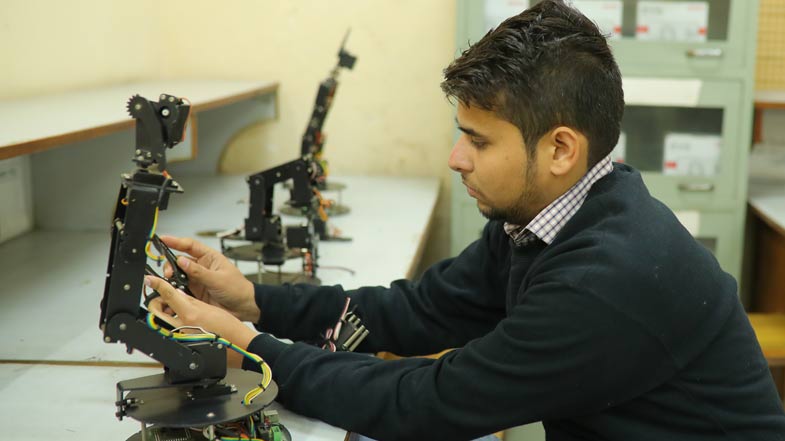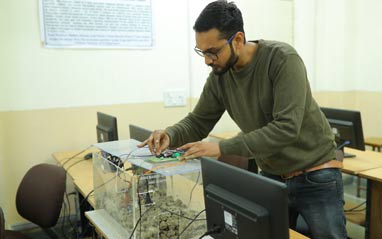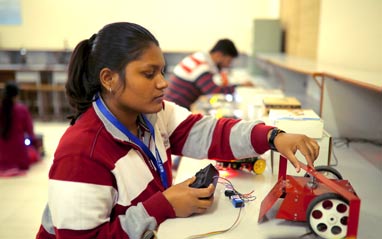Electronics & Communication Engineering
About
Vision
To become a globally recognized centre of learning, research, and innovation for sustainable growth in the field of Electronics and Communication Engineering.
Mission
- To impart quality education in the field of Electronics and Communication Engineering.
- To provide conducive environment for undertaking research, design & implementation of Engineering systems.
- To nurture and demonstrate high ethical values amongst stakeholders.



Programme Educational Objectives (PEOs)
- Graduates shall implement professional and technical knowledge in the Interdisciplinary domain.
- Graduates shall lead in industry, research & higher education/ entrepreneurship for shaping the future technologies.
Programme Outcomes (POs)
- PSO1: Apply the advancements in semiconductor technology and VLSI design.
- PSO2: Develop skills in signal processing applications, Robotics, Biomedical, and Space communication systems.
Innovative Teaching Methods
The Department of Electronics and Communication Engineering (ECE) is committed to
implementing modern and innovative teaching methodologies to enhance students’ learning
experiences. A blend of traditional and contemporary pedagogical approaches ensures a
dynamic, interactive, and industry-aligned academic environmennt.
- Integration of Modern Teaching Aids
- Teaching is supported by advanced tools such as LCD/LED projectors, interactive
boards with wireless pads, internet-enabled computer systems, and Wi-Fi-
enabled classrooms, ensuring an engaging learning experience.
- Teaching is supported by advanced tools such as LCD/LED projectors, interactive
- Digital Course Material Distribution
- Faculty members provide course materials in hard and soft copies through
MOODLE, email, and digital platforms before the commencement of classes. - Study resources are shared via email, department websites, and handouts for easy
accessibility.
- Faculty members provide course materials in hard and soft copies through
- Structured Lesson Planning
- Lesson plans, class test papers, and assignments are designed as per Bloom’s
Taxonomy to promote structured, goal-oriented, and progressive learning.
- Lesson plans, class test papers, and assignments are designed as per Bloom’s
- Activity-Based and Project-Based Learning
- Assignments focus on hands-on projects and activities to enhance students’
problem-solving skills and practical understanding.
- Assignments focus on hands-on projects and activities to enhance students’
- Programming Skill Development
- The Code-Tantra initiative is conducted to refine students' programming skills and
computational thinking.
- The Code-Tantra initiative is conducted to refine students' programming skills and
- Video Lecture Integration
- Relevant video lecture links are provided in the lesson plans to supplement
classroom learning with digital resources.
- Relevant video lecture links are provided in the lesson plans to supplement
- Beyond Syllabus Learning
- Additional topics beyond the curriculum are covered under UNIT 6 in the course
files, encouraging students to explore advanced concepts.
- Additional topics beyond the curriculum are covered under UNIT 6 in the course
- MOOC Courses for Self-Learning
-
Students are encouraged to enroll in Massive Open Online Courses (MOOCs) on
platforms such as NPTEL, Coursera, and LinkedIn Learning to gain additional knowledge and certifications.
-
- Industrial Readiness Skill (IRS) Courses
- IRS courses are offered to help students develop industry-relevant skills, bridging the
gap between academic learning and real-world applications.
- IRS courses are offered to help students develop industry-relevant skills, bridging the
- Workshops on Emerging Technologies
- Regular workshops are organized to introduce students to the latest technological
advancements in the field of electronics and communication engineering.
- Regular workshops are organized to introduce students to the latest technological
- Simulation-Based Learning
- Students gain practical exposure through industry-standard simulation tools such as
LabVIEW, MATLAB, and Cadence, enhancing their technical competence.
- Students gain practical exposure through industry-standard simulation tools such as
- Industry and Academic Visits
- Educational visits to industries and academic institutions are arranged to provide
students with hands-on exposure to real-world engineering applications.
- Educational visits to industries and academic institutions are arranged to provide
- Expert Guest Lectures
- The department invites industry experts, academicians, and researchers for guest
lectures, offering insights into cutting-edge developments and career guidance
- The department invites industry experts, academicians, and researchers for guest
Through these innovative and technology-driven teaching methodologies, the Department
of Electronics and Communication Engineering ensures a holistic, engaging, and future-
ready learning environment for students.
